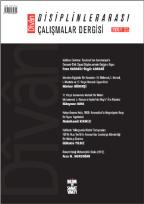26
Articles
In the period between the beginning of the 19th century and the first quarter of the 20th century, a transformation was witnessed in the Ottoman-Turkish political elites perception of society and politics. In this paper, changes in the evaluations of social and political change by the elites in the last period of the Ottoman Empire and the first period of the Turkish Republic will be analyzed. This will be done around concepts such as balance, harmony, reform, order, progress, and revolution, which occupy an important place in their lexicon.
Enes KABAKCI & Özgür ADADAĞThis article examines some of the reports written by Francesco Contarini, the Venetian bailo served in Istanbul between 1602 and 1604, within the context of the early 17th-century Ottoman dynastic and political crisis. These unpublished documents not only contain critical information on Sultan Mehmed III, his sons Ahmed I and Mustafa I as well as these sultans mothers, but also reveal that the Ottoman dynasty endured a serious threat of extinction during the early reign of Ahmed I.
Günhan BÖREKÇİBay al-îne contract, or muâmala-i şeriyye in Ottoman Turkish expression, is some form of a hîla-i şeriyye that was developed to avoid interest which is forbidden in Muslim communities, and it was observed that the Ottoman ulama especially Shayk Al-Islams have allowed this contract. But as seen in the case of the Treatise of Bay al-Îne by Muhammad bin Hamza al-Aydinî, some of the ulama have criticized this contract and argued that it was condemned (makrûh). In this article, the personality of Muhammad bin Hamza al-Aydinî and his work on muâmala-i şeriyye bey al-îne contract have been introduced, and a translation of the non-published treatise was presented.
Süleyman KAYAIn March 1909, Major Riza Bey Gjakova handed over a roll of papers to Recep, a discharged private who visited him in Aleppo on his way back to Albania. Being informed of the package, the police catched Recep and captured the papers, which appeared as fetwas of religous scholars of Aleppo and letters of Riza Bey written to Albanian chiefs in Kosovo, calling them to revolt against the Ottoman constitutional regime. Being timely with the 31 Mart Vakası (the counterrevolution attempt of April 13), this event was largely investigated by the government and many people were arrested, sentenced and exiled. The article deals with the details of the event and tries to contextualize the concepts of fatherland, nation, law, sharia, and caliphate, as mentioned in the letters.
Efforts of European powers to establish their political and economic domination over the rest of the world, were resulted in XIXth century with the successive colonization of various Muslim communities in Asia and Africa. When it came to the last quarter of the century, Ottoman State was the most powerful of a few Muslim political entities which were still independent states. As a consequence of this, the prestige of Ottoman Sultan as the Chaliph of Islam had increased drastically due to efforts of Ottoman Sultan Abdulhamid II. British officals in London as well as in Indain sub-continent were worrying about this growing influence of Ottoman Chaliph in their own colonies and started to publish speculative treatises discussing the legitimacy and functining of Ottoman Chaliphate. On the other hand, domestic opposites of Ottoman political regime, namely supporters of an constitutional system, were synchronically complaining of the explotation of the Chaliphate by the Sultan as an instrument to legitimate his autocracy. It was also their plan to restrict the sphere of influence of Ottoman Chaliphate through keeping it just as the moral leader of Muslim World. The Committee of Union and Progress which came to power following the dethronment of Abdulhamid II, inherited his foreign policy centred around Islamic Chaliphate and established a more radical autocracy in respect to the ancien regime. A minority group of liberal and secular minded Westernist intellectuals/politicans who were broken with CUP because of its authoritarian tendencies had now more critics about the political use of Chaliphate bty Ottoman sultan/government. Riza Tevfik was one of them. He did not hesitate to publicly announce his doubts and objections regarding Ottoman Chaliphate. He was forced in late 1922 by Kemalists to departure from Istanbul, then still under Brisitih occupation. Following the establishment of the new Republican regime in Turkey, he was also expelled from Turkish citizenship. He spent his first ten years as an political émigré in the Amirate of Transjordan founded under British tutelage and leaded by Amir Abdullah b. Al-Husayn. Focusing on an unpublished and recently unknown private letter written by Riza Tevfik to Colonel Henry Cox, the Britisih resident in Transjordan, this article aims to shed light on discussions concerning late Ottoman and post-Ottoman situation of Islamic Chaliphate.
Gültekin YILDIZThe basic assumption of the research is that it has great importance to identify the foreign schools established in the Ottoman Empire in all respects, from the point of view of the fact such schools spread the language, religion and culture of the countries they are affiliated to, and serve for the imperialist ambitions of such countries. Establishment of an Engineering School/Department under the Robert College, besides being an attempt which was projected to respond the needs of the empire, this educational institution has caught its age with its education and staff, and took place far ahead its peers particularly by enabling the students studying on real machines at workshops for the first time, and furthermore, it has assumed the expectation on that the students will make important contributions on the duties they will be assigned to after graduation. Hence, the Engineering School which may be considered as a part of the renovation policy in the field of technical education in Ottoman after the Tanzimat period appears as a matter which needs to be identified in terms of intention of foundation, education staff and programs.
Arzu M. NURDOĞAN





